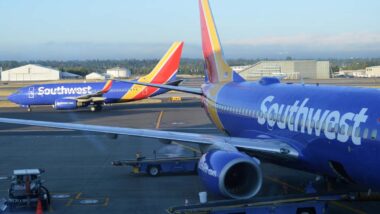Top Class Actions’s website and social media posts use affiliate links. If you make a purchase using such links, we may receive a commission, but it will not result in any additional charges to you. Please review our Affiliate Link Disclosure for more information.
A California federal judge has decided not to block the U.S. Department of Agriculture guidance that refuses extra food aid to certain households during COVID-19.
Last week, U.S. District Judge Haywood S. Gilliam Jr. denied the proposed Class’ request to block the USDA guidance, which would restrict benefits to households that have already reached their maximum monthly food allotment under the federal Supplemental Nutrition Assistance Program.
According to the judge, plaintiffs Robin Hall and Steven Summers did not establish that an injunction was warranted.
“The court acknowledges that plaintiffs’ argument that all SNAP households need support in the midst of the pandemic is compelling as an equitable matter,” Gilliam said in his order denying the preliminary injunction. “However, Congress, not the court, is charged with determining how best to weigh and triage the needs of all Americans during this time of crisis, taking into account the budgetary costs and benefits of various policy choices.”
In response to the coronavirus pandemic, Congress passed the Families First Coronavirus Response Act in March.
With this act, Congress provided “emergency allotments” related to SNAP, according to court documents.
SNAP benefits provide monthly amounts for eligible low-income households to use toward the purchase of food at various retailers, and was originally enacted by Congress “to promote the general welfare, [and] to safeguard the health and well-being of the Nation’s population by raising the levels of nutrition among low-income households,” the order says.
Congress enacted the Families First Coronavirus Response Act (FFCRA) and the Coronavirus Aid, Relief, and Economic Security Act, or CARES Act, on March 18 and March 27, respectively.
After the FFCRA was signed into law, the USDA issued guidance to state agencies regarding these “emergency allotments,” according to the lawsuit.
A sample in this guidance indicates states could ask “to provide an emergency allotment to address temporary food needs to households to bring all households up to the maximum benefit due to pandemic related economic conditions for up to 2 months,” court documents state.
The sample also advised that “[c]ontingent upon the availability of funding and ongoing need, USDA may approve additional months of emergency issuance with an extension request from the State.”
The CARES Act appropriated $15.8 billion for SNAP “to prevent, prepare for, and respond to coronavirus, domestically or internationally,” and required the funds to “be placed in a contingency reserve to be allocated as the Secretary [of Agriculture] deems necessary to support participation should cost or participation exceed budget estimates to prevent, prepare for, and respond to coronavirus.”
The USDA issued updated guidance for states regarding the FFCRA’s “emergency allotments” on April 21. With this guidance, the USDA clarified that “[a] household’s [emergency allotment] cannot increase the current monthly household SNAP benefit allotment beyond the applicable maximum monthly allotment for the household size,” court documents state.
The USDA concluded that SNAP households already receiving the maximum monthly allotment for their household size would not be eligible for emergency allotments.
The California Department of Social Services submitted its initial request for emergency allotments under the FFCRA on March 25, 2020, the lawsuit states.
In its cover letter, the department highlighted its disagreement with the USDA’s interpretation of Section 2302 of the FFCRA as limiting eligibility for emergency allotments to households not already receiving the maximum monthly allotment.
The agency said it found “this interpretation to be in conflict with both the plain language of the Act and the circumstances leading to the passage of the Act,” according to court documents.
The California Department of Social Services said due to COVID-19, many businesses closed temporarily or were operating with reduced staff. As a result, there were immediate and significant job losses throughout the state.

The California Department of Social Services proposed providing SNAP benefits to households with a $60-per-person emergency allotment, regardless of whether the household already received its maximum monthly allotment, in order to “provide a more equitable issuance” than the USDA’s approach.
The USDA responded to the agency via email on March 26, 2020, saying the proposal was “not aligned with the Emergency Allotment guidance,” according to court documents.
The next day, the department submitted a revised request, seeking emergency allotments to “raise each household’s regular monthly SNAP allotment to the maximum allowable allotment based on household size.” The USDA approved the revised request on March 30.
In his order, Judge Gilliam says providing emergency allotments equivalent to the maximum monthly allotment for all SNAP households would cost an extra $6.7 to $7 billion per month, “and would quickly outpace SNAP’s appropriated funds.”
In addition, on May 15, 2020, the House passed the HEROES Act, which seeks to increase SNAP benefits to “115 percent of the June 2019 value of the thrifty food plan” and to appropriate $10 billion more for SNAP.
The House added that increasing the maximum monthly allotment by 15% seems “unnecessary if the FFCRA already increased this maximum by 100% in the form of emergency allotments.”
“The Court finds that these facts cast further doubt on Plaintiffs’ interpretation of Section 2302(a)(1),” the order states.
The parties are required to submit a joint case management statement by June 23, 2020.
Do you have questions about your legal rights during the coronavirus? Visit Top Class Actions’ complete guide.
The SNAP recipients are represented by Alexander Baughan Prieto of the Western Center on Law & Poverty.
The Food Stamps Class Action Lawsuit is Robin Hall, et al. v. United States Department of Agriculture, et al., Case No. 4:20-cv-03454-HSG, in the U.S. District Court for the Northern District of California.
Join a Free Coronavirus Class Action Lawsuit Investigation
If you believe your rights were violated in a way that is directly related to the coronavirus pandemic, you may qualify to join this coronavirus class action lawsuit investigation.
ATTORNEY ADVERTISING
Top Class Actions is a Proud Member of the American Bar Association
LEGAL INFORMATION IS NOT LEGAL ADVICE
Top Class Actions Legal Statement
©2008 – 2024 Top Class Actions® LLC
Various Trademarks held by their respective owners
This website is not intended for viewing or usage by European Union citizens.
















4 thoughts onJudge Approves SNAP Limits During COVID-19
I would like to speak with someone about this because not only did I not get the extra EVERYONE ELSE GOT but I was already getting less then I should get because they say I owe them but won’t say for what and now they cut it again!! And won’t say why. I’ve asked for help and got no replies. I’ve asked why in writing and in person and received nothing in the form of an answer. I received an accounting sheet that shows nothing that would cause this to happen and this has been years of doing this to me. I have cancer and its really hard on me going down there or calling to just get an answer as to why this is going on and for what I owe them for. If you can help. It would be very appreciated
add me
Add me
Please add me